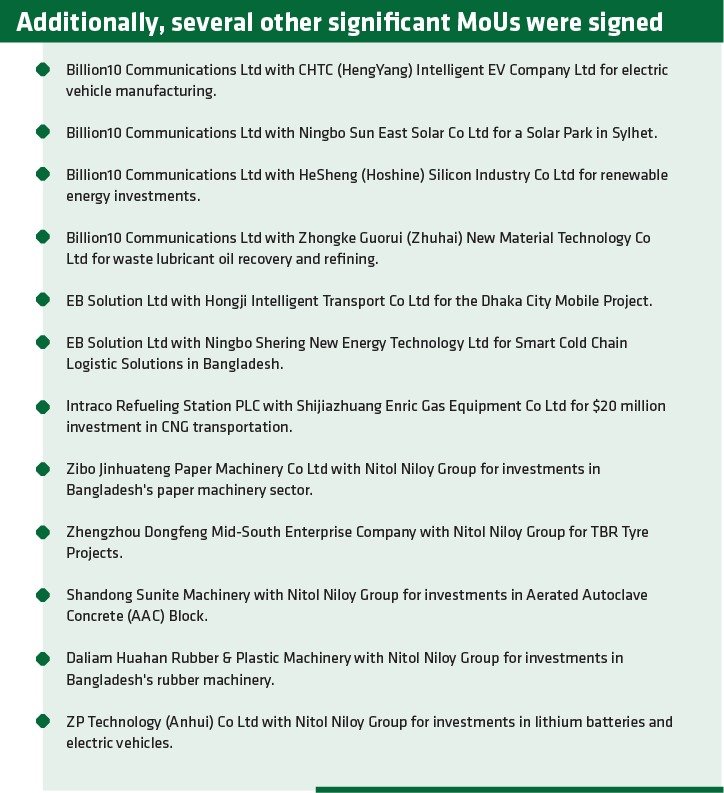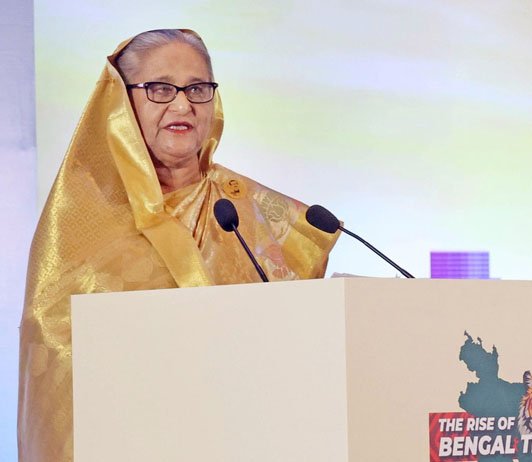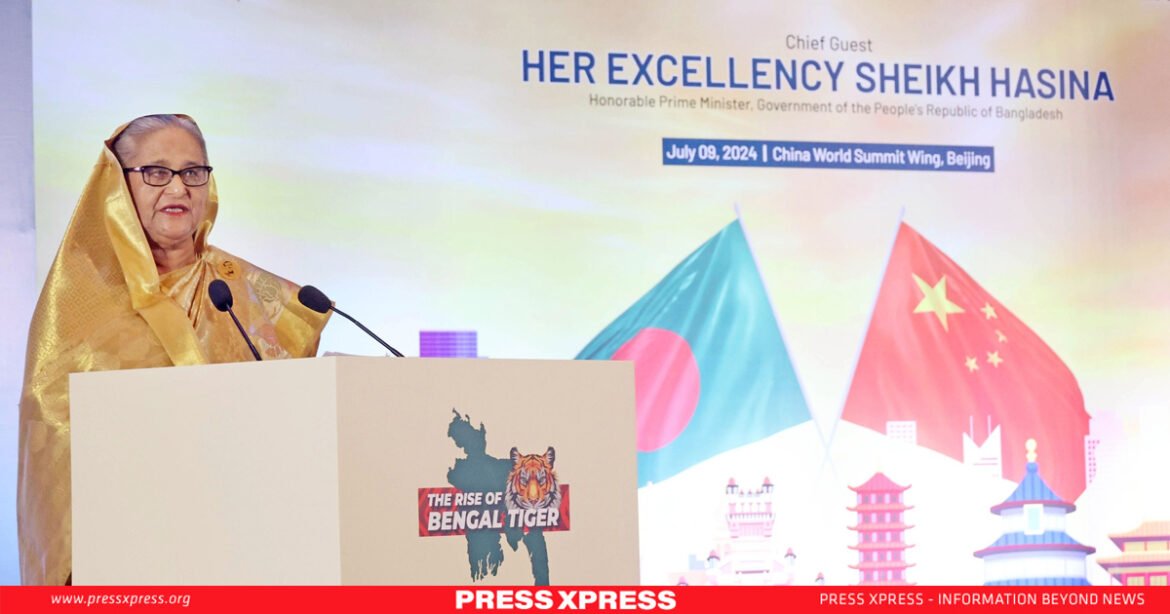Prime Minister Sheikh Hasina today urged the Chinese business community to capitalize on Bangladesh’s prime sectors, leveraging one of the world’s most liberal investment climates. Addressing a Summit on “Trade, Business, and Investment Opportunities between Bangladesh and China” in Beijing, she emphasized, “Now is the time to invest in Bangladesh, and I am confident that together, we can achieve significant milestones.”
The summit, held at the China World Summit Wing, Shangri-La Circle, Beijing, was organized by the Embassy of Bangladesh in Beijing, along with BIDA, BSEC, and CCPIT. Prime Minister Hasina highlighted the potential for collaboration in climate-resilient smart farming, which presents opportunities in agro-processing industries, including buy-back arrangements with China.
You can also read: Bangladesh’s Path to Export Growth in China: An Insights
Additionally, she outlined plans to establish three special tourism zones, inviting Chinese investment in real estate and hospitality sectors within these zones.
It is reported that Prime Minister Sheikh Hasina departed for Beijing on July 8 for a four-day bilateral visit. During her stay from July 8 to July 11, she is scheduled to engage in a bilateral meeting with Chinese President Xi Jinping on July 10 and hold delegation-level discussions with Chinese Prime Minister Li Qiang.

Bangladesh Signs $490M in MoUs with China
At the summit, Bangladeshi and Chinese companies inked 16 MoUs aimed at enhancing investment in Bangladesh, securing $490 million in funding across four key agreements:
- Nagad and Huawei Technologies (Bangladesh) Ltd. signed an MoU worth $50 million, forging a strategic partnership to develop a next-generation digital financial platform for a SMART Bangladesh.
- Dex Bangladesh Tech Ltd and Huawei Technologies (Bangladesh) agreed on a $20 million investment for the ‘Bangladesh Capital Market Digital Transformation Project’.
- Deshbondhu Group, Chemtex, and China Chemical CNCC signed a $400 million MoU to establish the largest PSF, PET bottle, and Textile grade factory in the Mongla Economic Zone.
- China Road and Bridge Corporation (CRBC) and Ningbo Cixing Company Limited agreed on an investment framework for Bangladesh’s Chinese Economic and Industrial Zone.

Bangladesh: The Gateway to Asian Economic Corridors
Elaborating on the rationale for investing in Bangladesh, Sheikh Hasina emphasized the country’s strategic geographical location with direct access to major international trade and shipping routes.

“We are positioned at the intersection of South Asian, Southeast Asian, and East Asian economic corridors. Our ports, airports, and land transport networks are continuously being upgraded to meet global standards, ensuring efficient and seamless logistics.”
– PM Sheikh Hasina
She emphasized Bangladesh’s substantial domestic market and its proximity to adjacent markets, presenting abundant opportunities for regional growth. She noted that Bangladesh offers one of the most investor-friendly environments globally, supported by the Bangladesh Investment Development Authority (BIDA), which provides comprehensive services to foreign investors under a single umbrella.
Furthermore, she outlined Bangladesh’s initiative to establish 100 Special Economic Zones (SEZs), each equipped with modern amenities. The government’s policy prioritizes private sector participation in infrastructure development such as roads, railways, and ports through public-private partnerships.
In addition to these measures, Prime Minister Hasina mentioned Bangladesh’s development of five country-specific Economic Zones aimed at strengthening economic ties with strategic partner nations. She affirmed ongoing governmental reforms aimed at fostering a conducive business climate, ensuring stability, and predictability for investors.
PM Hasina’s Vision for a Tech-Driven Future
The Bangladesh government has enacted necessary legislation, simplified procedures, ensured transparency and improved infrastructure to facilitate smoother and more efficient business operations. In a significant move towards sustainable economic growth, Bangladesh has introduced its first logistics policy aimed at enhancing domestic and international trade and investment capacities through the establishment of a world-class, technology-driven, time-efficient, and eco-friendly logistics system.
Emphasizing the role of private sector investment in infrastructure development—such as roadways, railways, and seaports—through public-private partnerships, the government aims to bolster connectivity both regionally and globally.
Prime Minister Sheikh Hasina highlighted ongoing investments in digital and physical infrastructure, aimed at transforming Bangladesh into a dynamic logistics hub. She noted achievements in achieving nationwide electricity and internet coverage, as well as the launch of Bangladesh’s first communication satellite, Bangabandhu-I, marking a milestone in technological advancement.
Notably, Bangladesh boasts the world’s second-largest community of registered IT freelancers and is actively establishing 38 high-tech parks to attract foreign investment in promising sectors. Looking ahead, Sheikh Hasina articulated a vision to establish a ‘Smart Bangladesh’ by 2041.
Highlighting Bangladesh’s demographic dividend, Sheikh Hasina underscored its youthful and dynamic workforce, with a median age of around 27 years. She emphasized that investing in Bangladesh offers access to a large pool of skilled and semi-skilled labor, known for its cost-effectiveness and strong work ethic, thus positioning the country as an attractive destination for international investment and collaboration.
From Textiles to Technology, A Strategic Leap Towards China!

Bangladesh is eager to expand its exports to China, focusing on textiles, garments, leather goods, jute products, and agricultural produce. Emphasizing the importance of fostering business cooperation, she encouraged Chinese companies to engage in joint ventures with Bangladeshi firms. This collaboration aims to facilitate technology transfer, skill development, and mutual market access.
Highlighting the significance of research and development for fostering innovation and competitiveness, she proposed exploring new avenues of trade and investment cooperation between Bangladesh and China. Addressing the Chinese business community, she stressed Bangladesh’s resilience during the pandemic, noting its sustained economic growth.
Bangladesh is slated to graduate from the UN’s Least Developed Countries category in 2026, having achieved consistent economic expansion, averaging 6.7% growth over the past fifteen years. The economy has grown from $ 102 billion in 2009 to over $ 460 billion in 2023, with a peak growth rate of 8.15% just before the pandemic.
Furthermore, Bangladesh’s per capita income has surged to $2,784, marking a five-fold increase over the last two decades. Its export volume has exceeded $50 billion, and the country received a net FDI of $2.8 billion in 2022. Bangladesh is among the world’s leading countries in remittance earnings and now ranks the 33rd largest economy globally.
Looking ahead, esteemed think tanks project Bangladesh to potentially rise to the rank of the 24th largest economy by the early 2030s. The government is closely collaborating with the private sector to realize this goal.


